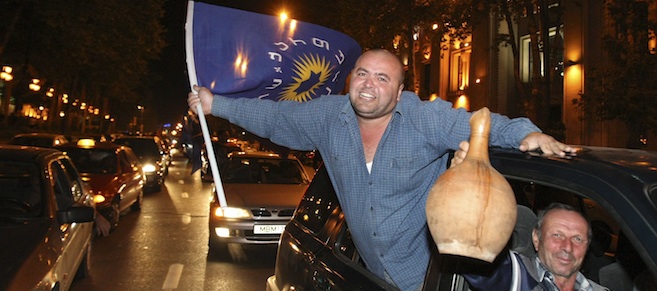Georgia just had its first peaceful power transition—ever
In unprecedented move, President Saakashvili gracefully conceded his party’s defeat
Opposition supporters react on the central square during a rally in Tbilisi Georgia, Monday, Oct.1, 2012. Georgia’s opposition coalition ‘Georgian Dream’ is leading the country’s just-concluded parliamentary elections, according to the exit polls of a U.S.-based exit poll specialist company Edison Research and a Germany-based market research company GfK on Monday. Voters in Georgia are choosing a new parliament in a heated election Monday that will decide the future of President Mikhail Saakashvili’s government. (AP Photo/Shakh Aivazov)
Share

Nothing is routine in a place where routine has never been given a chance to settle in. On Oct. 2, the ruling party in Georgia counted the votes in a parliamentary election, realized it had lost, conceded defeat and prepared to hand over power without fuss.
Nothing like that had ever happened before in Georgia.
For generations in the homeland of Joseph Stalin, putsch and betrayal were the standard techniques for political succession. The most recent transition was more peaceful but not more voluntary: an anti-authoritarian Rose Revolution put an end to years of dreary post-Soviet oppression in 2003 when much of the population rose up to protest fixed elections. But the revolution’s principle beneficiary, Mikheil Saakashvili, had not lost an election since. Frequent allegations of election impropriety left the distinct impression he was not interested in putting his power to an honest test.
So it was to Saakashvili’s credit that he conceded immediately after preliminary results showed his governing United National Movement had lost to the upstart Georgian Dream coalition, led by a shadowy expat billionaire named Bidzina Ivanishvili. Saakashvili stays on as President, but most government powers will be exercised by a government of Georgian Dream parliamentarians led by a prime minister who’ll probably be Ivanishvili.
Saakashvili — U.S.-educated, well-connected within Republican Party circles in Washington, a man who at times was appearing on CNN more frequently than Wolf Blitzer — may yet be re-elected as president. But he stands rebuked by his own people, many of whom had feared that he was becoming a latter-day variation of the anti-democratic thugs he had claimed to supplant.
Allegations of vote-rigging were chronic. Members of Saakashvili’s regime defected, one by one, to opposition parties. Then in 2008 Saakashvili managed to get himself into a brief, brutal shooting war with neighbouring Russia over the status of a breakaway Georgian region. Saakashvili and his Western supporters believed he was the victim. Other observers noted that Georgia had fired the first shot. In the end, nobody offered Georgia any real help. Saakashvili’s only salvation came from the Russian leader Vladimir Putin, whose tanks cut through Georgia’s troops like a knife through butter but who ordered them to stop short of Georgia’s capital.
The confrontation rattled Georgians. Punitive Russian economic sanctions have hurt the Georgian economy. Ivanishvili, who got rich in Russia and has been bankrolling development projects throughout the little country, advocates for a normalization of relations with Georgia’s overbearing neighbour. Is he a Russian stooge? He wouldn’t be the first: Putin likes to punish independent-minded neighbours, most notably in Ukraine, and help install more pliable types in their place. But Ivanishvili’s campaign portrayed him as a more reliable Western ally than Saakashvili turned out to be, and the U.S. State department was quick to congratulate Georgian Dream on its victory.
Saakashvili would probably have won yet another election victory if Georgian television, which he worked hard to control, had not turned against him in spectacular fashion on Sept. 18. That night a news program broadcast video of prisoners being tortured and raped with broom handles in a penitentiary outside Tbilisi. That kind of barbarism was supposed to be relegated to Georgia’s past. Voters decided to ensure that it would be.
For all his failings, Saakashvili was no cartoon villain. He deserves credit for rapidly increasing investment in Georgia, thanks to international goodwill that blossomed after he came to power and lasted until the war with Russia. Ivanishvili must ensure that, having won fairly, he continues to play fairly. This was Georgia’s first fully democratic election. It must not be the last.